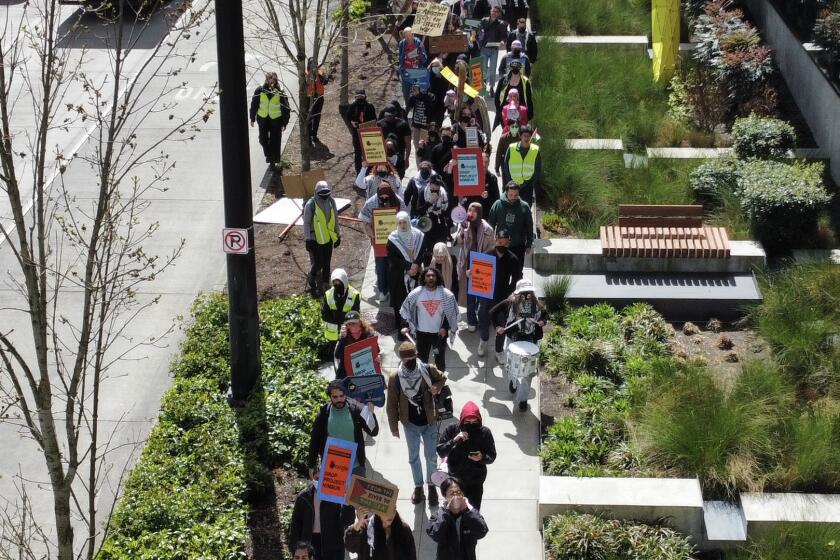Broadcast networks ‘upfront’ dollars
Television’s cliffhanger this year isn’t “Who shot J.R.?” but how many bullets the broadcast networks might take.
ABC, CBS, Fox and NBC for decades have leveraged their dominance to hike ad rates despite shrinking audiences. Advertisers grudgingly wrote bigger checks because they recognized that, even with viewership on the decline, network prime-time shows were still the biggest game in town.
Broadcasters no longer seem so invincible.
Slumping ratings, the lousy economy, ailing automakers -- some of the biggest advertisers on TV -- and increased competition from cable channels will make it harder for the networks to hold on to the $9 billion in prime-time commercials booked during the so-called upfront market.
Wall Street expects sales during the annual bazaar -- which begins today in New York -- to be down 15% compared with last year, for a total haul of about $7.4 billion for prime-time TV commercials.
The upfront is closely watched as a barometer of the ad market. Typically, networks sell as much as 80% of their commercial time for the coming year. Whatever remains unsold is negotiated later in the “scatter” market, when advertisers often pay higher rates.
Not surprisingly, given the economy, advertisers say they will demand rollbacks in rates. That’s troubling for Walt Disney Co., CBS Corp., NBC Universal and News Corp., all of which depend on high rates to help cover the escalating costs of producing shows.
“Both sides are digging in over price,” said Marci L. Ryvicker, media analyst at Wachovia Capital Markets. “Advertisers are still very wary of the economy. Their budgets are down, so the networks will have a smaller piece of the pie.”
No one knows, however, whether Madison Avenue will make good on its threat to withhold dollars.
Last year, some analysts expected lower ad sales, but the market turned out to be strong. The upfront for the broadcast networks, cable channels, syndicated shows and Spanish-language television combined is about $20 billion.
“What makes this year so different is there is uncertainty regarding everything,” said Sam Armando, director of audience analysis for media buying giant Starcom Worldwide. “A lot of people are not ready to commit to their advertising budgets, understandably so, because of the economy.”
The market, which usually wraps up by the end of June, could drag on this year -- and if advertisers spend less, the reverberations could be felt throughout Hollywood. The recession, declining DVD sales and a drop in TV commercial production in Los Angeles have hobbled an industry that is still reeling from last year’s writers strike.
“The networks are really nervous, and the advertising agencies are under even more pressure to negotiate lower prices,” said producer Chris Coelen, chief executive of RDF Media USA, which makes shows such as “Wife Swap” for ABC.
It is a high-stakes gamble for both sides. If the broadcast networks hold firm on their prices, those dollars might then jump to cable networks, which charge much less for commercial time.
“There are a lot of other options for buying video now other than just television,” Armando said, referring to Internet video sites and movie theaters.
If the broadcast networks hold back inventory, they might be rewarded by commanding higher rates in the scatter market. The economy could stabilize, and if the networks launch a hit or two, that could whip up interest and prices.
On the flip side, advertisers remember those who sat on the sidelines during upfront market only to be punished later by paying higher rates.
“I think it’s going to be interesting,” said Mike Pilot, president of sales at NBC Universal.
In addition to fears about the economy, other factors will come into play.
NBC’s decision to shift Jay Leno to prime-time from late-night alters the equation. The network is expected to save hundreds of millions in program costs that would have been spent producing one-hour dramas for 10 p.m.
But industry insiders say the Leno move could also cost NBC more than $100 million in advertising next season.
“There is no historical precedent for how much you should value time on that show,” said Jason Maltby, a top buyer for ad agency Mindshare.
Advertisers say rates for Leno’s prime-time show should be closer to those fetched by his late-night show, which are substantially less. Leno’s ratings are expected to be lower than for a scripted show.
NBC executives say that over time, however, the Leno move will make financial sense because the comedian will produce more than 45 weeks of original episodes that will perform better than drama reruns.
Despite ratings declines, ABC and Fox are expected to try to convince advertisers that their shows are worth more because they attract a greater number of affluent viewers.
And CBS is the only major network to increase its audience this season, which the network hopes will give it an edge in negotiations.
“Our returning shows have done exceptionally well,” said Jo Ann Ross, president of sales at CBS. “We are taking share away from our competitors.”
But cable networks, which have invested in developing original dramas and comedies, also are poised to capture the upfront dollars that are up for grabs.
“Advertisers have been paying too much for too long by paying the legacy tax charged by the broadcast networks for their past performance,” said Turner Broadcasting sales President David Levy, warming up to a pitch he is likely to make to sponsors. “We provide a more efficient buy.”
This year’s market may not have a TV feel-good ending.
“It’s a zero-sum gain this year,” said Maltby of Mindshare. “There is a finite amount of revenue out there. Any dime that you will be able to steal will have to come out of someone else’s pocket.”
--
More to Read
The biggest entertainment stories
Get our big stories about Hollywood, film, television, music, arts, culture and more right in your inbox as soon as they publish.
You may occasionally receive promotional content from the Los Angeles Times.







